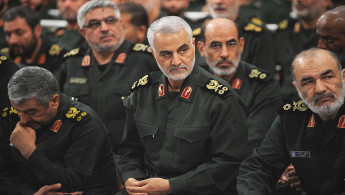Top Iranian general Qassem Soleimani in Baghdad 'to shape new government'
Iranian Revolutionary Guards commander Gen. Qassem Soleimani is in Baghdad to push for the formation of a new 'friendly government' in Iraq, after preliminary results show anti-Iranian coalition ahead
2 min read
Soleimani is in Baghdad to push for the formation of a new government [Anadolu]
Iranian Revolutionary Guards commander General Qassem Soleimani is in Baghdad to push for the formation of a new "friendly government" in Iraq, after preliminary results show anti-Iranian coalition ahead.
Soleimani - who heads the Iranian Revolutionary Guard Corps [IRGC] foreign arm al-Quds Force - arrived in Baghdad on Tuesday morning to meet with Shia leaders in the country to discuss the results of the elections and the form of the new government, according to local Iraqi press reports.
The reports come a day after Iraqi leaders - including outgoing Prime Minister Haider al-Abadi - met with the envoy for the US-led anti-Islamic State group coalition Brett McGurk "to discuss the formation of a strong and stable Iraqi government", according to a statement from Iraq's parliament speaker.
Sources close to former prime minister Nouri al-Maliki - who is close to Iran - told al-Ghad Press, Soleimani was in Iraq to discuss the formation of a next government following last weekend's elections.
Iraqi government officials approached by The New Arab's Arabic service neither confirmed nor denied the visit, but sources in Abadi's office said Soleimani was expected in Iraq because of the confusion produced by the election results.
Nationalist Shia cleric Muqtada al-Sadr is now on course to win the largest number of seats after the Iraqi election.
Sadr - the former leader of the anti-Western Mahdi Army during the US occupation - ran on a campaign promising to stamp out corruption but has also been keen to distance himself from Iranian influence.
The partial results are a severe blow to incumbent Prime Minister Haider al-Abadi, whose Victory Alliance [al-Nasr] is currently third in the polls, according to partial results. Shia militia chief Hadi al-Amiri's bloc - which is backed by Tehran - in second place.
Soleimani - who heads the Iranian Revolutionary Guard Corps [IRGC] foreign arm al-Quds Force - arrived in Baghdad on Tuesday morning to meet with Shia leaders in the country to discuss the results of the elections and the form of the new government, according to local Iraqi press reports.
The reports come a day after Iraqi leaders - including outgoing Prime Minister Haider al-Abadi - met with the envoy for the US-led anti-Islamic State group coalition Brett McGurk "to discuss the formation of a strong and stable Iraqi government", according to a statement from Iraq's parliament speaker.
Sources close to former prime minister Nouri al-Maliki - who is close to Iran - told al-Ghad Press, Soleimani was in Iraq to discuss the formation of a next government following last weekend's elections.
Iraqi government officials approached by The New Arab's Arabic service neither confirmed nor denied the visit, but sources in Abadi's office said Soleimani was expected in Iraq because of the confusion produced by the election results.
Nationalist Shia cleric Muqtada al-Sadr is now on course to win the largest number of seats after the Iraqi election.
Sadr - the former leader of the anti-Western Mahdi Army during the US occupation - ran on a campaign promising to stamp out corruption but has also been keen to distance himself from Iranian influence.
In September, Sadr made a surprise state visit to Iran's Sunni rival Saudi Arabia.
Sadr was leading in the polls with more than half the votes counted, a surprise comeback for a Shia leader who had been sidelined by Iran-backed rivals.The partial results are a severe blow to incumbent Prime Minister Haider al-Abadi, whose Victory Alliance [al-Nasr] is currently third in the polls, according to partial results. Shia militia chief Hadi al-Amiri's bloc - which is backed by Tehran - in second place.
"The victory of the Sadrists has put both Iran and the US in a tough position," Dr. Ahmad al-Hamdani, Iraqi political analyst, told The New Arab's sister Arabic publication.
"Iran perceives Sadr as an unstable entity... and the US does not see him as an ally... there are unpredictable scenarios now surrounding the formation of the new government."





 Follow the Middle East's top stories in English at The New Arab on Google News
Follow the Middle East's top stories in English at The New Arab on Google News
![The UAE is widely suspected of arming the RSF militia [Getty]](/sites/default/files/styles/image_330x185/public/2024-11/GettyImages-472529908.jpg?h=69f2b9d0&itok=Yauw3YTG)
![Netanyahu furiously denounced the ICC [Getty]](/sites/default/files/styles/image_330x185/public/2024-11/GettyImages-2169352575.jpg?h=199d8c1f&itok=-vRiruf5)
![Both Hamas and the Palestinian Authority welcomed the ICC arrest warrants [Getty]](/sites/default/files/styles/image_330x185/public/2024-11/GettyImages-2178351173.jpg?h=199d8c1f&itok=TV858iVg)